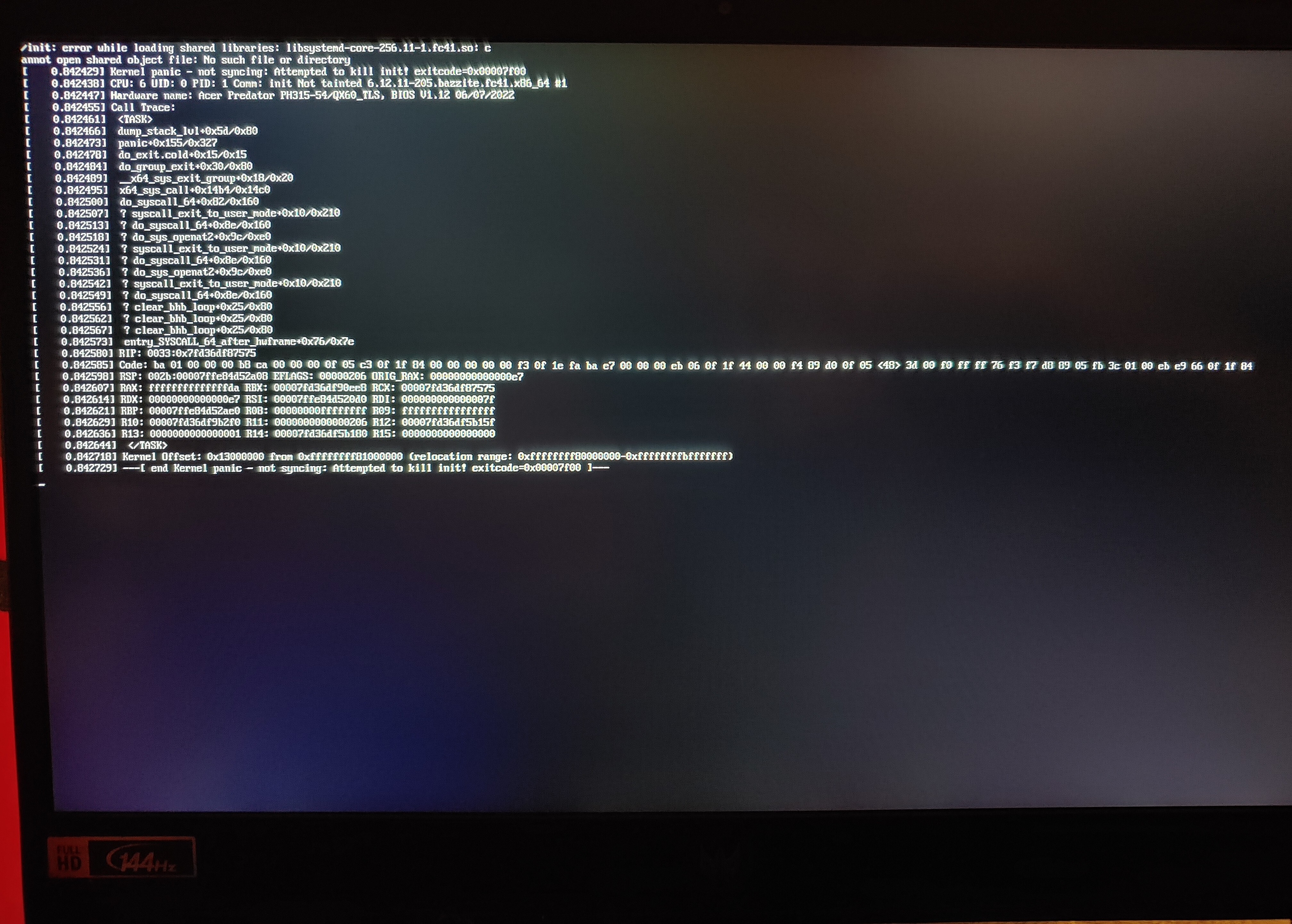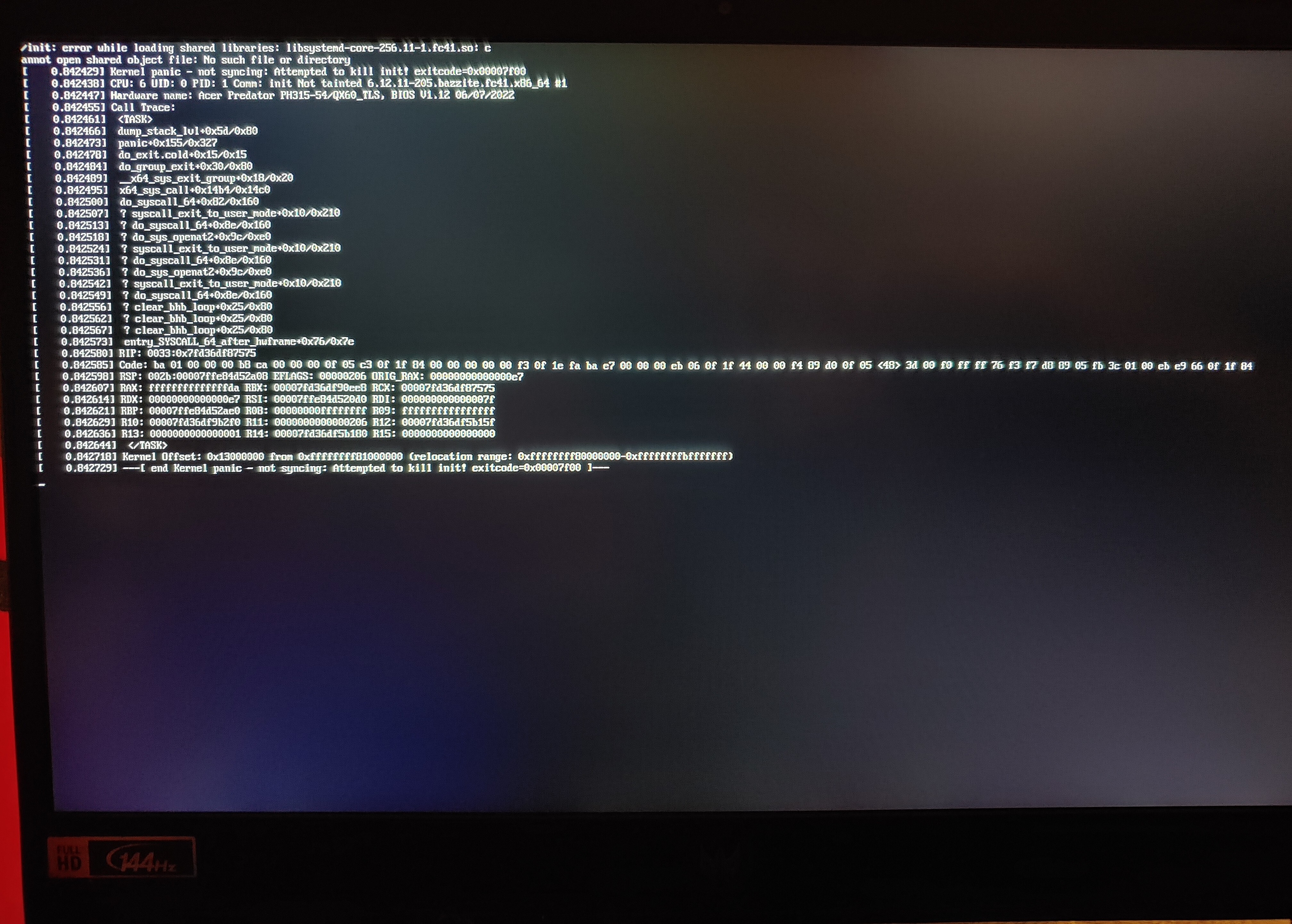ope, kernel panic :/
-
When you say "boot," do you mean that your computer started but didn't start the OS?
And yes, I believe that's the correct command to pin an image. It's either that or
1. As you update, it will eventually become image3and just live there until you unpin it. -
I have no idea what Bazzite is.
The error says that there's a missing file. If it used to work, but after you updated, upgraded, compiled, installed or something to get a new kernel, it broke.
I'm guessing that you installed the wrong kernel or didn't update the initial ramdisk correctly.
You might be able to boost using the previous kernel, but I'd start with trying to figure out what you did to get here.
You should be able to boot from the installation media in rescue mode to fix this, but that won't happen until you know what's broken.
-
Ostree: 0 caused the kernel panic, but in grub I selected ostree: 1 (I rolled back to a previous update) and was able to get to the desktop like expected. Boot is the wrong term, sorry.
-
init crashed because it couldn't load a shared library, but init isn't allowed to be killed so the kernel panicked
-
You'll be wanting sudo ostree admin pin 1 seeing as 0 was broken. Double check with rpm-ostree status.
Proceed to rpm-ostree update, if that does nothing it means 0 is up to date, personally I'd just wait for a new update using the working deployment, but you can blow away 0 and get it again if you're keen.
-
Disclaimer: I have no experience with Bazzite. A quick web search shows that it's a distro based on Fedora Atomic. That being said, if you did everything according to the documentation, this is probably a bug that should be raised with the developers.
The first line states
/init: error while loading shared libraries: libsystemd-core-256.11.1-fc41.so: c. This is basically the issue, for whatever reason the shared library for systemd (which if being used, is basically the backbone to your systems startup) isn't available. The next place I would look is whatever tool/command you use to upgrade/build your system, this might of spit out an error related to why this library could not be built or why it's inaccessible on the next boot. If the solution isn't obvious from those logs, I would report this to the distro developers as a ticker in their bug tracker.As to look at the positives, you have discovered the beauty of immutable/atomic distros. You can just go back to the working version instead of cussing at your PC.
-
You're right, it's 1. I went ahead and pinned it. I ran rpm-ostree update and it's still not working, I'll keep using the working deployment for the weekend and I'll have more time to troubleshoot Monday and Tuesday.
At least I understand what the kernel panic message means thanks to the people here.
-
The developers are active on Discord and I'll make a post there Monday when I have more time to tinker with it and reply to people, and until then I'll enjoy the perks of an atomic distro, lol. Thanks for your help and the thorough explanation!
-
You did everything right. Boot into the image that works, and then apply
rpm-ostree rollback. This reverses the broken image and the working one, so you'll boot into this one the next time you boot up until you change something in the order, e.g. by updating.In the meantime, wait a day or so and then update again.
On what channel are you on?
bazzite:latestorbazzite:stable? -
Thanks for your help. I was planning on waiting a few days because I'll have more free time on Monday, I'll try updating again on Monday.
I'm on stable.
-
Update: Good (?) news - I just ran into a comment on the Discourse group linking to this post because they're having the same issue, and several more people posted on the Bazzite Discord.
I didn't break it!
-
Yeah you'd want to pin whatever image number you're using. You're basically saying, "Yeah, #1 is the good one I want to save for later."
-
I've been using Debian unstable since 4 months and I never got a kernel panic. The biggest problems I faced was with the Nvidia drivers but I learned how to deal with it (by not using the drivers in the official repo)




